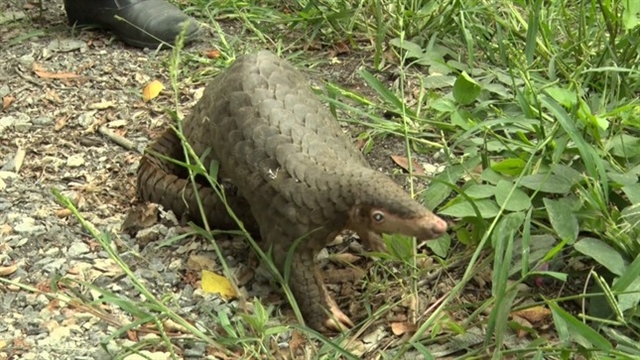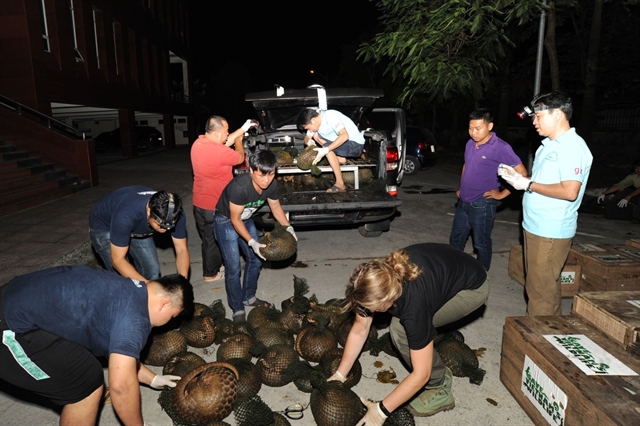 Environment
Environment

 |
| A Save Vietnam's Wildlife team rescues illegally trafficked pangolins in Hưng Yên Province. — VNA/VNS Photo |
HÀ NỘI — In Việt Nam, where thousands of wild animals are illegally trafficked each year, wildlife rescue centres have become a lifeline, saving these animals from death and returning them to their natural habitats.
Trương Ngọc Ánh, a veterinarian at Save Vietnam's Wildlife, a non-profit rescue centre, explained that trafficked animals often arrive in dire conditions—dehydrated, malnourished and injured from traps.
Timely and continuous care is essential to their survival, making rescue work a demanding, round-the-clock job.
"Just before Tết (Lunar New Year) in 2023, we rescued six animals, including two pangolins. On the first day of the new year, one pangolin couldn’t defecate, so I had to perform a procedure to help it. For many, this might seem like bad luck, but for us, saving an animal is the best fortune," Ánh told the Voice of Vietnam.
Trần Văn Trường, another staff member at the centre, said the joy of releasing rehabilitated animals back into the wild keeps him motivated. "After a long recovery process, seeing them return to nature feels like welcoming a new year," he said.
At the Endangered Primate Rescue Centre in Cúc Phương National Park, Đỗ Đăng Khoa described the relentless nature of the work.
Even during holidays, rescue calls can come at any time. Once, on New Year’s Eve, his team was summoned to rescue a white-legged langur. They worked through the night, prioritising the animal’s urgent medical needs over celebrations.
"We were called to rescue a white-legged langur. We arrived at midnight and had to decline an invitation to celebrate because the animal needed immediate care," he recalled.
Months later, the langur not only recovered but also reproduced, a milestone Khoa likened to welcoming a new family member.
Rehabilitating primates, in particular, is a long and challenging process. Trần Ngọc Anh, from the Phong Nha-Kẻ Bàng National Park Rescue Centre, explained that many primates lose their natural behaviours and require years of care to relearn how to forage and interact.
Only when they can function as a group are they released back into the wild.
He also said Việt Nam in the past often released confiscated animals directly into the wild without health checks or quarantine, sometimes outside their natural habitats. This practice posed significant risks to local wildlife populations.
Today, rescue efforts are more structured, with input from experts and organisations, leading to higher success rates in rehabilitation and release.
Harold Browning, a British animal behaviour expert who has volunteered in Việt Nam for a decade, praised the country’s progress in wildlife conservation.
He highlighted the Phong Nha-Kẻ Bàng National Park Rescue Centre as having some of the highest standards for wildlife release in the world. Browning also recalled a four-year project to release hornbills as a particularly memorable achievement.
He expressed hope that one day, rescue centres will not be needed because illegal trafficking will end. Animals belong in the wild, not in captivity, he emphasised.
Browning also marvelled at Việt Nam’s biodiversity, describing its forests as 'a miracle' compared to the heavily altered landscapes in many other countries.
He expressed joy that young Vietnamese people are increasingly engaged in conservation efforts. Recently, the Hanoi Wildlife Rescue Centre hired several young staff members who are eager to innovate and learn.
Tẩn Lổ Quẩy, a staff member at the rescue centre in Hoàng Liên National Park, shared the challenges of fieldwork, including conducting surveys at over 2,200m above sea level in freezing conditions.
To raise awareness, Quẩy has turned to social media, using his TikTok channel to share stories like that of Princess Bư, a rescued sun bear. Bư, who arrived at the centre as a malnourished cub, has thrived under his care for over three years.
His videos have inspired many young people, sparking interest in wildlife conservation and the importance of protecting endangered species for future generations.
"Your work is amazing. It’s taught me so much about wildlife conservation. We need to protect these animals for future generations," a TikTok user commented on his videos.
As Việt Nam continues to combat the illegal wildlife trade, the dedication of its conservationists offers hope for the country’s endangered species, one rescue at a time. — VNS




